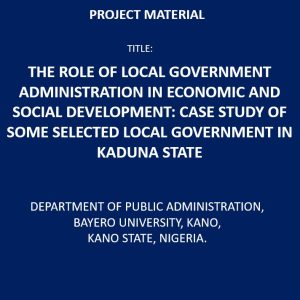No products in the cart.
An Appraisal of Poverty Alleviation Programme in Nigeria
₦10,150.00
AN APPRAISAL OF POVERTY ALLEVIATION PROGRAMME IN NIGERIA
- CASE STUDY: A CASE STUDY OF UNGOGO LOCAL GOVERNMENT AREA OF KANO STATE NIGERIA
- PROJECT YEAR: 2023
- NUMBER OF PAGES: 89
- FILE TYPE: DOC
- DEGREE: BACHELOR
- INSTITUTE: DEPARTMENT OF PUBLIC ADMINISTRATION, FACULTY OF MANAGEMENT SCIENCE. BAYERO UNIVERSITY KANO
ABSTRACT
The study examined the appraisal on the impact of poverty alleviation programmes in Nigeria: A study of Ungogo local government area of Kano State. Survey design was used in this study to generate data. The study population comprised the youth in the Local Government Areas of Ungogo, Kano. A sample of 120 respondents from the Ungogo local government area youths was studied. Out of the 120 copies of questionnaire administered, 100 copies were retrieved and after going through them 92 copies were found useful for data analysis. Descriptive and inferential statistics used to analyse data in this study. Pearson’s Product Moment Correlation Co-efficient (r) was used to test the hypotheses in this study. Lots of programmes were put in place to alleviate poverty in the country, however for the case of this study, it is centred on the N-power programme initiated by President Muhammad Buhari (8 June, 2016). The study found that the major activities of N-Power programmes towards Poverty alleviation in Ungogo local government area include: N-Power Teach, N-Power Agro, N-Power Health and N-Power VAIDS. The study found that N-Power programmes generate empowerment for the youths in Ungogo local government. The study revealed that N-Power Programmes’ beneficiaries are mainly university and polytechnic graduates. The study found that the major factors affecting the implementation of N-Power programmes towards poverty alleviation in Ungogo local government include: Insufficient information, non-payment of stipend to participants as at when due, bribery and corruption, wrong bank verification number (BVN), overbearing hands of politicians in the programme, high transportation fare paid by the participants to work, website and internet hiccups, poor funding of the programme. N-Power aspires to provide a platform where most Nigerians can access skills acquisition and development. N-Power is also linked to the Federal Government’s policies in the economic, empowerment and social development arenas.

